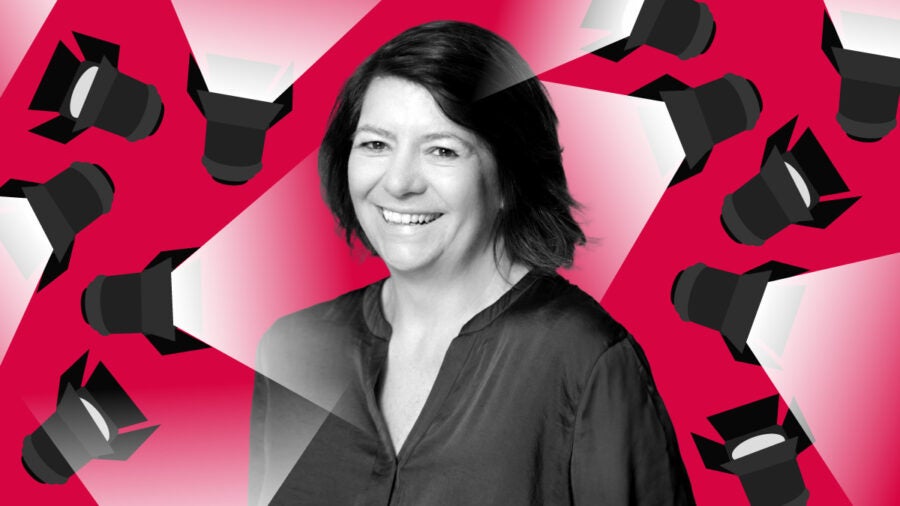
When Kathryn Jacob was asked to become CEO of cinema advertising company Pearl & Dean at the end of 2005, she’d already made other plans.
“I’d been with Scottish Media Group (which owns Pearl & Dean) for a while, I had a very small child and I’d just decided to take some time out,” she explains.
When the group‘s CEO asked to meet Jacob to discuss the role, it was such a surprise that she’d already dispensed with the services of her nanny, meaning that she had to take her baby to the meeting.
“All I could think was: ‘Please don’t let my daughter be sick on his trousers,’” Jacob recalls.
She managed to avoid that outcome and found herself agreeing to become CEO for a trial period of six months from January 2006. Nearly 18 years later, she’s still in post.
Approaching transformation as a new CEO
“Because I thought I had only six months, I did a lot of things very quickly, specifically concerning culture and reporting,” Jacob says.
Instead of shutting herself away in a corner room, she worked out in the open-plan office, immediately making herself more accessible. She then banned internal meetings, which used to “go on for longer than Oppenheimer”, from running any longer than an hour.
While Jacob stresses that embedding cultural change is generally a long game, she says that she “soon started receiving really good feedback. After the first couple of months, I thought: ‘Oh, I’ve actually got this.’ We could start building on those foundations.”
Jacob set out to make quick decisions, but was equally prepared to change tack promptly if any choice appeared to be wrong. The momentum generated by this dynamic approach encouraged staff to become part of the process.
“We were pulling ideas out of people who had been there for a while, who’d previously felt that the pace of change wasn’t sufficient,” she says. “Your challenge as a leader is always the same: to have your people in the best place they can possibly be. You need to ensure that they’re forward-facing and well equipped – that they enjoy what they do and can fulfil their potential.”
How Pearl & Dean survived Covid
This focus on people and culture is a key reason why Pearl & Dean survived the pandemic. The firm’s business model involves working with clients to get their products and services in front of cinemagoers. This can be because a client is launching something at about the same time as a film is being released or because the tone of a given movie fits well with their brand’s image. Clearly, none of this applies when every cinema is closed for business.
Pearl & Dean’s partnership with outdoor cinema provider Luna helped to safeguard some income when the first UK-wide Covid lockdown was imposed in March 2020, but most of its revenue streams dried up overnight.
Faced with the crisis, Jacob and her senior team took a 40% pay cut and made use of the government’s furlough scheme so that they could avoid making redundancies. They then decided to use the enforced downtime to implement infrastructure and system upgrades without having to worry that these might impinge on any income-generating operations.
“We didn’t know when everything was going to open up again,” Jacob says. “So we also went on this massive information dump, running seminars and sessions for clients.”
Crucially, she focused on preserving the company’s culture during this testing period. When socially distanced gatherings became an option, for instance, Pearl & Dean coordinated postcode-based meetings and gave employees money to go and have a coffee together. Jacob even hosted meetings in her own home for small groups once a fortnight.
When the Covid restrictions finally eased and cinemas reopened, “the whole team was in place and we just hit the ground running”.
What the future holds for cinema advertising in 2023
Today, despite the industry’s lingering Covid hangover and the Hollywood writers’ strike, Jacob is feeling optimistic. She has good reason. As this article goes to press, Barbie is the 14th-highest-grossing film of all time. Top Gun: Maverick, Oppenheimer and The Super Mario Bros Movie have been pulling in huge audiences too.
Perhaps most crucially for Pearl & Dean, 72% of cinemagoers consider the ads to be an integral part of the experience, Jacob claims, quoting a 2022 Fame (film, audience measurement and evaluation) survey. The same research also found that 76% of respondents consider cinema ads to be superior to TV commercials.
But cinema attendance in the UK has not yet returned to pre-Covid levels. This is partly because what customers want from cinemas is changing, according to Jacob. She believes that the days of super-sized multiplexes in out-of-town retail parks are numbered, as they are outperformed by boutique chains such as Everyman.
Turning her attention to the advertising industry more broadly, Jacob remains unmoved by the hype surrounding the transformational potential of emerging technology. “Everyone was going on about the metaverse 18 months ago,” she says. “Now it’s AI and how it will change the way we create.”
More important to Jacob, when she’s contemplating the future of the sector, is not what’s changing but what’s staying the same.
She explains: “It’s still the case that, if you do a really great bit of advertising, it resonates with people. Perhaps AI will be different, but it depends on whether it has the ability to touch people and make them feel warm about a product.”
Jacob remains convinced that the power of advertising remains undiminished, whether it’s persuading people to respect Covid restrictions or getting them to associate John Lewis with the Christmas period. And that’s just as well, as she clearly loves her job.
“We work in the best industry in the world,” she says. “We get paid to go to the cinema. That’s pretty cool.”
You’d be hard pressed to find anyone who’d disagree with that.

When Kathryn Jacob was asked to become CEO of cinema advertising company Pearl & Dean at the end of 2005, she’d already made other plans.
“I’d been with Scottish Media Group (which owns Pearl & Dean) for a while, I had a very small child and I’d just decided to take some time out,” she explains.
When the group‘s CEO asked to meet Jacob to discuss the role, it was such a surprise that she’d already dispensed with the services of her nanny, meaning that she had to take her baby to the meeting.





